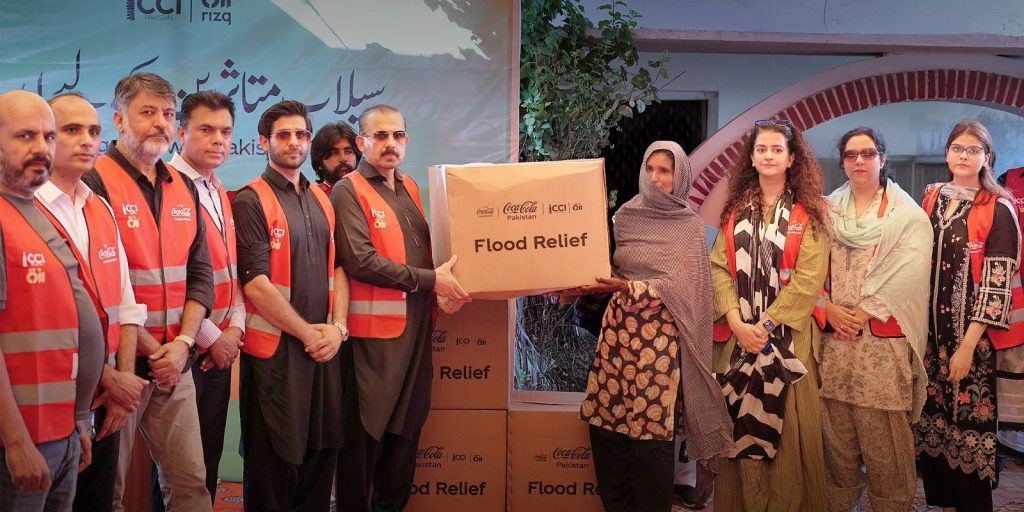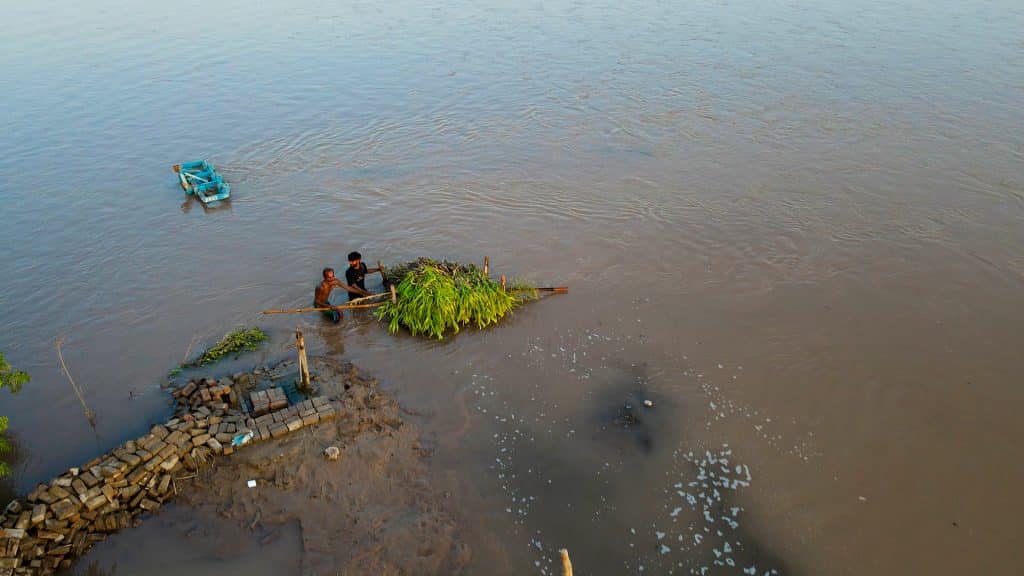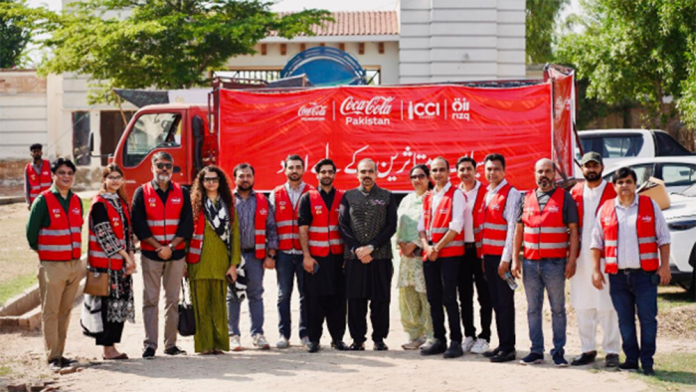At sunrise, the main road into Khanewal is lined with people. Families stand quietly, some holding children, others clutching jerry cans for water. A convoy of trucks pulls in, stacked high with sacks of flour, rice, and bottled water. This is the face of an unfolding relief effort. In district after district across Punjab, Khyber Pakhtunkhwa, and Gilgit-Baltistan, Rizq, a social enterprise with deep-rooted links with communities, has launched its relief action with feverish fervor. Most of its team members haven’t slept for 18 hours straight making their way to the remotest communities, often on dirt tracks which before floods were mettled roads. The tireless dedication of the on-ground teams is the engine driving this massive operation, turning logistical nightmares into moments of genuine human connection and aid delivery.
Rizq has over the years gained much more than the trust of the communities. For the flood relief drive, it got a trusted ally from the corporate community when The Coca-Cola Foundation and Coca-Cola System in Pakistan reached out to them to initiate one of the largest private-sector food relief initiatives of the season—delivering over 550,000 meals to families displaced by the floods.
“We have worked with Coca-Cola before. Every year, we set up Ramadan Dastarkhwans in partnership with Coca-Cola Pakistan,” explains CEO of Rizq, Qasim Javaid. “We value the trust of our partners and ensure that their contributions reach the deserving with complete integrity, transparently and respectfully.” This commitment to transparency and accountability is central to Rizq’s operational philosophy, a vital factor in securing and maintaining large-scale corporate partnerships necessary for such immense relief work.

The challenge for Rizq this time is much more demanding but critical. According to the estimates of the United Nations, since late June, a heavier-than-usual monsoon, followed by floods and landslides, has affected more than 6 million people. The devastating impact of the crisis in Pakistan, according to the National Disaster Management Authority (NDMA), includes a tragic loss of over 1,000 lives. The destruction is widespread: more than 12,500 homes are damaged, 6,500 livestock have been lost, and crops have suffered extensive ruin nationwide. Compounding the human toll, over 2 million people have been displaced, while health officials are cautioning that areas across the country face a high risk of waterborne illnesses, such as cholera. The sheer scale of the displacement has put immense strain on the existing infrastructure of host communities, making the timely and organized distribution of aid even more paramount.
To mitigate the food insecurity of the impacted families, Coca-Cola has supported Rizq to distribute more than 3,000 ration hampers packed with flour, oil, sugar, and lentils—enough to feed a family for an entire month. Rizq has also set up a community dastarkhwan serving freshly cooked meals where stoves and utensils have been washed away. More than 100,000 servings of safe drinking water are being transported in Dasani bottles to settlements where contaminated water threatens outbreaks of disease. Bedding, blankets, and feminine hygiene kits, all critical as winter approaches, have also been handed over to Rizq for families that have lost all their belongings with the floodwaters. The inclusion of non-food items like bedding and hygiene kits reflects a holistic approach to relief, addressing not just immediate hunger but also the dignity and health of those affected.
In one corner of the relief site, a volunteer group unfurls plastic sheets, laying them on the ground to seat women and children. Steel plates are passed out; steaming pots of lentils and bread are served. The children eat first, with the elderly guided in behind them. These simple, organized acts of care restore a semblance of normalcy and order in an environment of chaos.

The drive has been made possible by a USD 100,000 grant from The Coca-Cola Foundation and USD 30,000 more from the Coca-Cola System, including Coca-Cola Beverages Pakistan Limited (CCI Pakistan), the company’s Turkish bottling partner in Pakistan. But it is not only corporate financing at work here. Teams of volunteers in reflective jackets, local Rizq organizers, Coca-Cola volunteers and even district administration officers—unload supplies together, sweating under the midday sun. This convergence of private, non-profit, and government entities highlights the necessity of a multi-stakeholder approach to tackle national disasters effectively.
“This contribution is critical to stabilizing communities,” shares Qasim, overseeing the distribution. “Coca-Cola’s assistance, including the time and effort of its volunteers, goes beyond material aid, showing those affected that they are not alone. Natural disasters are profoundly traumatic and can shatter an individual’s sense of safety and control, leading to feelings of loneliness, fear, anxiety, and helplessness.” The human-centric focus of the aid, treating the emotional and psychological toll with as much importance as the material loss, is a distinguishing feature of the joint effort.
An elderly farmer named Shabbir Hussain steps forward, ration bag in hand. His village near Jalalpur Pirwala had been cut off for days before the trucks arrived. “We lost everything in the floods,” he says. “This is the first proper food we’ve had in weeks. It means survival.” His words underscore the life-saving impact of the timely intervention.

For Coca-Cola, the relief effort is part of a continuum of support. In 2022, following the catastrophic floods, the company had extended help in Balochistan, distributing hygiene kits and even installing a solar-powered water filtration plant in Thatta. This year’s operation, thanks to the swift and meticulously designed relief plan carefully by Rizq team, is larger, faster, and tailored to the needs of isolated communities facing a bitter winter. The learning from past relief actions has clearly enabled a more efficient and targeted response this time around.
The bustle at the Khanewal site continues late into the evening. Volunteers stack empty ration bags, while children lick the last traces of lentils from their plates. As floodwaters have receded, these moments—of shared food, of corporate resources meeting human need—become lifelines; an assurance to the communities that life can and will be restored.
For now, the numbers—half a million meals, thousands of hampers, hundreds of volunteers—tell one story. The quieter story is written on the faces of those who leave with heavy sacks balanced on their shoulders and a renewed sense of possibility.


